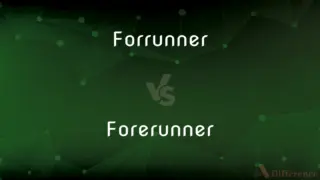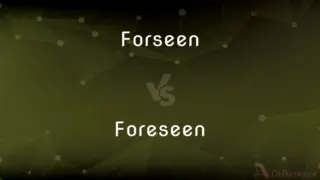Beign vs. Begin — Which is Correct Spelling?
By Tayyaba Rehman — Updated on April 2, 2024
Beign is incorrect. The correct spelling is Begin, meaning to commence or start.
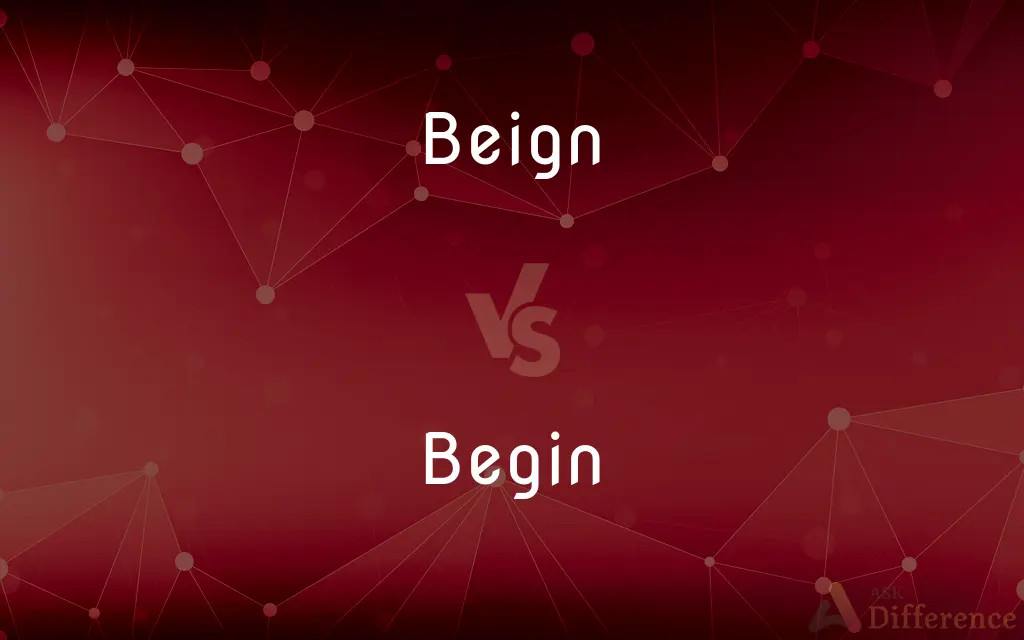
Table of Contents
Which is correct: Beign or Begin
How to spell Begin?

Beign
Incorrect Spelling

Begin
Correct Spelling
ADVERTISEMENT
Key Differences
Think of "Beginning" to recall "Begin."
It's "Begin" with a "gin," not "Beign" with a "gein."
"Beign" lacks a sound component; always look for that "g."
Recollect the phrase "Begin the task," ensuring "Begin" starts with "Beg."
Remember "Begin" sounds like "Big-In." If you're about to start something, it's a "big in."
ADVERTISEMENT
How Do You Spell Begin Correctly?
Incorrect: Where do we beign looking for clues?
Correct: Where do we begin looking for clues?
Incorrect: She couldn't beign to explain how she felt.
Correct: She couldn't begin to explain how she felt.
Incorrect: Let's beign the meeting with a quick introduction.
Correct: Let's begin the meeting with a quick introduction.
Incorrect: The concert will beign at eight o'clock sharp.
Correct: The concert will begin at eight o'clock sharp.
Incorrect: I need to beign working on my project soon.
Correct: I need to begin working on my project soon.
Begin Definitions
To start or commence.
Let's begin the meeting.
To first experience or do something.
He began learning piano at age 5.
To embark on a task or activity.
She began her speech with a quote.
To originate or be the starting point.
Rivers begin in mountains.
To perform or undergo the first part of an action; start
I began to email you but got interrupted. The rain began around noon.
To come into being
When life began.
To do or accomplish something in the least degree. Used in the negative with an infinitive
Those measures do not even begin to address the problem.
To say as the first in a series of remarks
"I didn't like the movie," he began.
To have as a first element or part
The play begins with a monologue.
To have as the lowest price in a range
Those shirts begin at $20.
To have as a first position, stage, or job
The restaurant began as a ice-cream parlor. The principal began as a math teacher.
To take the first step in doing; start
Began work.
To cause to come into being; originate
An invention that began a new era.
To come first in (a series, for instance)
The numeral 1 begins the sequence.
(ambitransitive) To start, to initiate or take the first step into something.
I began playing the piano at the age of five.
Now that everyone is here, we should begin the presentation.
(intransitive) To be in the first stage of some situation
The program begins at 9 o'clock on the dot.
I rushed to get to class on time, but the lesson had already begun.
(intransitive) To come into existence.
(nonstandard) Beginning; start.
To have or commence an independent or first existence; to take rise; to commence.
Vast chain of being! which from God began.
To do the first act or the first part of an action; to enter upon or commence something new, as a new form or state of being, or course of action; to take the first step; to start.
When I begin, I will also make an end.
To enter on; to commence.
Ye nymphs of Solyma ! begin the song.
To trace or lay the foundation of; to make or place a beginning of.
The apostle begins our knowledge in the creatures, which leads us to the knowledge of God.
Beginning.
Israeli statesman (born in Russia) who (as prime minister of Israel) negotiated a peace treaty with Anwar Sadat (then the president of Egypt) (1913-1992)
Take the first step or steps in carrying out an action;
We began working at dawn
Who will start?
Get working as soon as the sun rises!
The first tourists began to arrive in Cambodia
He began early in the day
Let's get down to work now
Have a beginning, in a temporal, spatial, or evaluative sense;
The DMZ begins right over the hill
The second movement begins after the Allegro
Prices for these homes start at $250,000
Set in motion, cause to start;
The U.S. started a war in the Middle East
The Iraqis began hostilities
Begin a new chapter in your life
Begin to speak or say;
Now listen, friends,
Be the first item or point, constitute the beginning or start, come first in a series;
The number 'one' begins the sequence
A terrible murder begins the novel
The convocation ceremoney officially begins the semester
Have a beginning, of a temporal event;
WWII began in 1939 when Hitler marched into Poland
The company's Asia tour begins next month
Have a beginning characterized in some specified way;
The novel begins with a murder
My property begins with the three maple trees
Her day begins with a work-out
The semester begins with a convocation ceremony
Begin an event that is implied and limited by the nature or inherent function of the direct object;
Begin a cigar
She started the soup while it was still hot
We started physics in 10th grade
Achieve or accomplish in the least degree, usually used in the negative;
This economic measure doesn't even begin to deal with the problem of inflation
You cannot even begin to understand the problem we had to deal with during the war
Begin to speak, understand, read, and write a language;
She began Russian at an early age
We started French in fourth grade
To initiate or set into motion.
Begin the countdown.
Begin Meaning in a Sentence
It's time to begin thinking about college applications.
To begin with, I'd like to thank everyone for coming.
You need to begin the exercise with a warm-up.
Begin each day with a positive thought.
The story begins on a dark and stormy night.
The meeting will begin as soon as the director arrives.
When did you begin learning English?
Let's begin the lesson with a review of yesterday's material.
It's never too late to begin a new hobby.
Begin your presentation with a brief introduction of yourself.
The construction project will begin next month.
Let's begin the discussion on chapter five.
Begin the experiment by measuring the chemicals carefully.
The class will begin with a quick quiz on last week's topics.
Before you begin painting, make sure to cover the furniture.
The ceremony will begin with the national anthem.
To begin making the cake, first preheat the oven.
Begin Idioms & Phrases
Begin at square one
To start something over because the first attempt failed.
After the prototype broke, we had to begin at square one.
Let's begin again
A suggestion to start something from the beginning.
This painting isn't working out; let's begin again.
To begin with
Used to start a list of items or points.
To begin with, we need to address the budget shortfall.
Where to begin?
Expressing uncertainty about how to start addressing a complex issue.
The house is so messy, where to begin?
Begin the ball rolling
To start an activity or process.
I'll begin the ball rolling with the project proposal.
Begin with the end in mind
To start something with a clear idea of your desired outcome.
When planning your career, begin with the end in mind.
To not know where to begin
Feeling overwhelmed and unsure of how to start dealing with something.
There's so much to do; I don't know where to begin.
Begin on the right foot
To start something in a promising or positive way.
She wanted to begin her new job on the right foot, so she arrived early.
Begin with a bang
To start something with great enthusiasm or success.
The new restaurant began with a bang, with customers lining up outside.
A good place to begin
A suggestion of a good starting point.
Researching online is a good place to begin.
Common Curiosities
Which vowel is used before Begin?
Typically, "a" as in "a beginning."
What is the singular form of Begin?
Begin.
What is the root word of Begin?
The Old English root is "beginnan."
Which preposition is used with Begin?
"with" as in "begin with an introduction."
Why is it called Begin?
It comes from the Old English "beginnan," meaning "to undertake."
What is the verb form of Begin?
Begin.
What is the pronunciation of Begin?
/bɪˈɡɪn/.
Which conjunction is used with Begin?
Any conjunction can be used depending on the sentence, e.g., "and," "but," or "or."
Which article is used with Begin?
Either "a" or "the" can be used, depending on the context.
Is Begin an adverb?
No, Begin is a verb.
Is Begin a negative or positive word?
Neutral, though context can change its connotation.
What is the plural form of Begin?
Begin is a verb, so it doesn't have a plural form.
Is Begin a noun or adjective?
Begin is a verb.
Is the Begin term a metaphor?
No, but it can be used metaphorically in some contexts.
What part of speech is Begin?
Verb.
What is another term for Begin?
Commence.
What is the opposite of Begin?
End or conclude.
Which determiner is used with Begin?
It depends on the context, but as a verb, it typically won't use a determiner.
Is Begin a collective noun?
No.
Is the word Begin imperative?
It can be used in an imperative manner, e.g., "Begin now!"
Is the word “Begin” a Direct object or an Indirect object?
"Begin" is a verb and doesn't function as an object itself. However, it can have direct and indirect objects in a sentence.
What is a stressed syllable in Begin?
The second syllable, "gin."
What is the first form of Begin?
Begin.
Is Begin a vowel or consonant?
Begin is a word, not a letter.
How do we divide Begin into syllables?
Be-gin.
What is the second form of Begin?
Began.
What is the third form of Begin?
Begun.
How is Begin used in a sentence?
She decided to begin her journey at dawn.
Is Begin an abstract noun?
No, it's a verb.
Is the word Begin a gerund?
"Beginning" is the gerund form of Begin.
Is Begin a countable noun?
No, Begin is a verb.
How many syllables are in Begin?
Two syllables.
Share Your Discovery
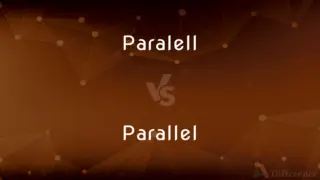
Previous Comparison
Paralell vs. Parallel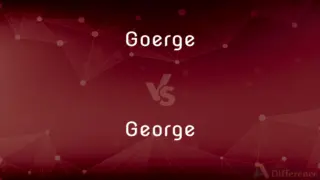
Next Comparison
Goerge vs. GeorgeAuthor Spotlight
Written by
Tayyaba RehmanTayyaba Rehman is a distinguished writer, currently serving as a primary contributor to askdifference.com. As a researcher in semantics and etymology, Tayyaba's passion for the complexity of languages and their distinctions has found a perfect home on the platform. Tayyaba delves into the intricacies of language, distinguishing between commonly confused words and phrases, thereby providing clarity for readers worldwide.





























